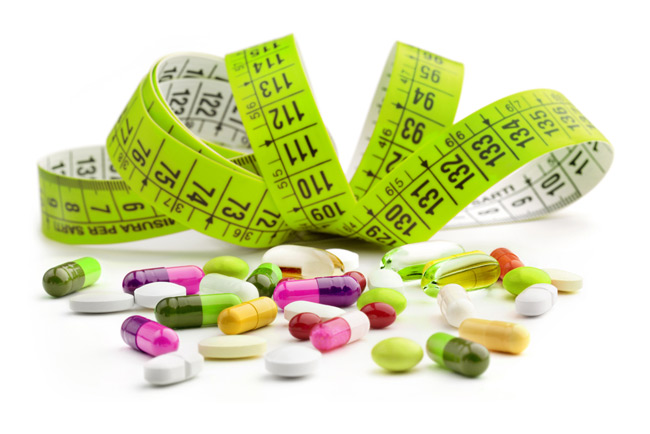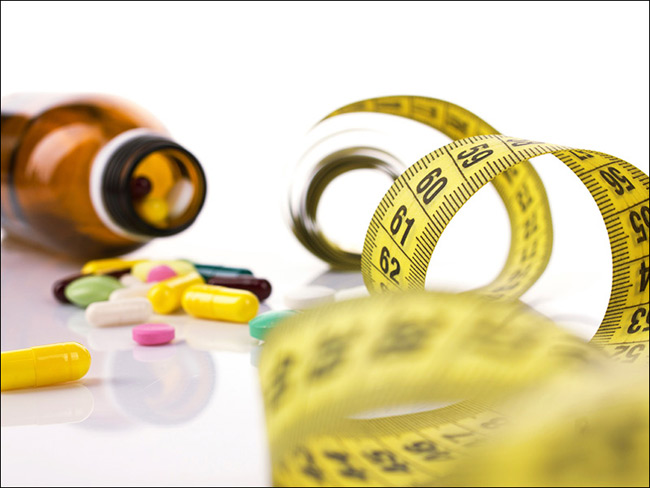Weight-loss drugs may sound like a dieter’s dream. But they aren’t a good choice for everyone who’s overweight. In fact, many doctors reserve them for people with weight-related health problems.

It’s best to lose weight through a healthy diet and regular exercise. But if you’re among those who struggle to lose weight and the excess weight has produced medical problems, weight-loss drugs may be able to help you.
Here’s an update on their credentials:
- Drugs which flush water out of the body. Diuretics (or “water pills”, as they’re called) increase the rate at which water is excreted from the body. They have the same ‘weight –loss’ effect as saunas and steam baths: you lose water, not fat, and as soon as you replenish your body with fluids, you’ll get all that weight back. Because diuretics deprive the body of essential minerals like potassium and sodium, they are avoidable unless you have a specific disorder such as fluid retention (and then, only under medical supervision). Diuretics have no legitimate place in a normal weight-loss programme.
- Drugs which raise levels of thyroid. The only valid use for these drugs is in those persons who have low thyroid levels. They produce less thyroxin, a hormone which helps fat-burning, and as a result are likely to be obese. Such persons improve with thyroid therapy. But thyroid drugs are not advisable as a routine prescription for raising metabolic rate in the overweight. That is because they can achieve this effect in healthy people only when taken in dangerous amounts.
- Drugs that depress the appetite. They are also known as anorectics from the medical term, anorexia, which means loss of appetite. They include amphetamines and amphetamine-like drugs. Amphetamines are drugs which stimulate the nervous system; they also increase the metabolic rate and suppress the appetite. Soon, however, the body develops a tolerance for the drug, and it will not have its appetite-suppressant effect at the initial dose. You’ll need increasingly stronger doses to achieve the same effect, leading to drug dependency. Besides causing dependency, such drugs can also have direct health hazards such as raising the heart rate (tachycardia) and blood pressure.
- Drugs which temporarily raise the metabolic rate. They are known as thermogenics (e.g.. Ephedrine, and ephedra-based products like ma-huang). After deaths were reported with “Herbal Ecstasy”, the American FDA took some brands off the market, but weight-loss formulas can still be bought off shelves in the U.S. and other countries. Thermogenics supposedly work by increasing the body’s core temperature so that you’re working in a “hotter” environment and burning more fat. But some experts say they aid weight loss by working as appetite suppressants really, almost like amphetamines. As their effect wears off, you’ll crave food, besides feeling fatigued. Thermogenics are yet to be tested in clinical trials to determine whether they carry the risks of elevated heart rate and blood pressure, as strongly suspected by the medical community. Until these tests are done, they are definitely contraindicated for those with any kind of heart or circulatory problem.

- Drugs which produce a feeling of fullness. These drugs are known as bulking agents. Taken with water before a meal, the bulking agent swells in the stomach, producing a sensation of satiety, which takes the edge off your appetite. Though they do not act on the central nervous system and do not have the dangerous side-effects of amphetamines, they do produce tolerance – which means that, over a period, the initial dose is no longer sufficient to bring about the intended effect, and a higher dose must be taken. Besides, the dependency that they cause is unlikely to motivate their user to introduce the diet and other lifestyle changes that constitute the basis for permanent weight loss. Used too often, or in high doses, they are also likely to have a laxative effect and may even bring on diarrhoea You can get a similar appetite – suppressing effect eating a high-fibre diet. Bran, for instance, used in soups, or breakfast cereal can blunt the edge of hunger. Wholegrains, wholegrain breads, fruits and vegetables, peas and beans are other cheaper ways of bulking up your meal and allowing you to eat fewer calories. They are a safer, healthier alternative to bulking agents.
- Drugs that prevent calories from being absorbed by the intestines. These include the “starch blockers” and “fat blockers” which supposedly allow you to eat your cake and lose weight too. But research on starch blockers found that starch was not excreted by pill users- instead they caused mal-absorption with noxious side effects, including nausea, vomiting , cramps, diarrhoea and bacterial fermentation in the gut. For this reason, they proved more appealing in theory than in reality and the FDA in the U.S. banned them. The latest drug “off the block” in this category is xenical, which is said to prevent absorption of up to one-third of fat by the body.
- Drugs that help your body to burn fuel more efficiently. This category comprises supplements that supposedly enable your body to use glucose more efficiently instead of quickly storing carbohydrates as fat. The “hottest” weight-loss supplement right now is chromium – as chromium picolinate, which is supposedly more easily absorbed than chromium alone, and as chromium polynicotinate. The net effect of its weight-loss claim is that it lowers body fat by preserving muscle. There’s no scientific evidence whatsoever that chromium supplements help you to lose weight. A study on football players at the University of Massachusetts found that chromium pills did not help them to Build muscle or lose fat.
Combining weight-loss drugs with a low-calorie diet and regular exercise can help you lose more weight than can either drugs or lifestyle changes alone. Combining all three — medication, fewer calories and more activity — can help you lose anywhere from 5 percent to 10 percent of your total body weight within a year.

Factors to consider
You and your doctor need to carefully evaluate the potential benefits of taking a drug and weigh them against the possible long-term risks. Your doctor will also consider your health history, the possible side effects and the potential interaction of weight-loss drugs with other medications you’re taking.
Keep in mind that some health insurance plans don’t cover weight-loss prescription drugs. And some companies may require prior authorization before covering the expense. If you’re unsure of your prescription coverage, contact your health insurance provider.
These medications can help you with weight maintenance, especially if you continue exercising regularly. Butkeeping off the pounds once you’ve lost them is an ongoing concern. And despite your efforts, you might still regain the weight.
As you consider weight-loss drugs, make sure that you make every effort to exercise, change your eating habits and adjust any other lifestyle factors that have contributed to your excess weight.
Weight-loss drugs aren’t the easy answer to weight loss, but they can be a useful tool to help you make the necessary diet and lifestyle changes.
Related Links
- Too Fat? Pop a Pill.
- Easy ways to boost veggie servings
- Chromium Picolinate: Supplement for weightloss
- Very Low Calorie Diet for obesity
- Preventing Weight Gain
- Meal Replacement Shakes – A Healthy Choice
- How much to exercise for healthy Weight loss
- Improving your metabolism
Disclaimer
The Content is not intended to be a substitute for professional medical advice, diagnosis, or treatment. Always seek the advice of your physician or other qualified health provider with any questions you may have regarding a medical condition.
